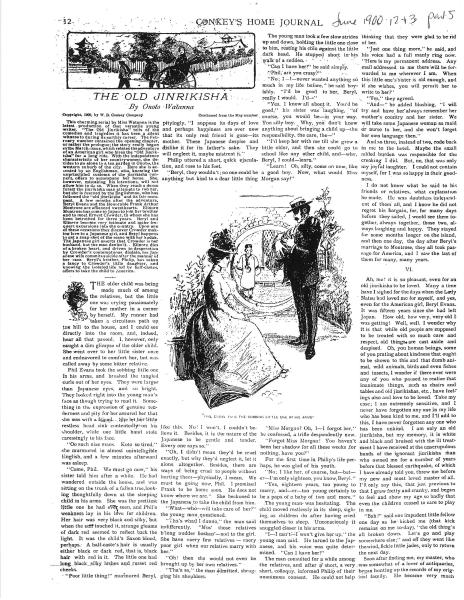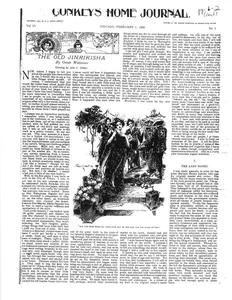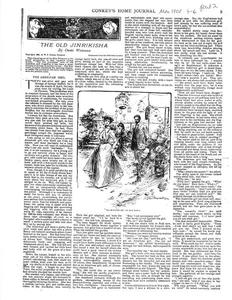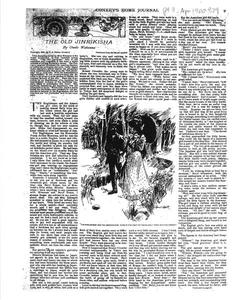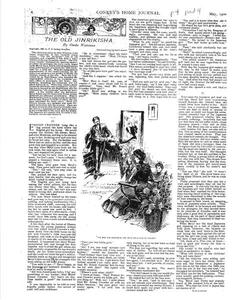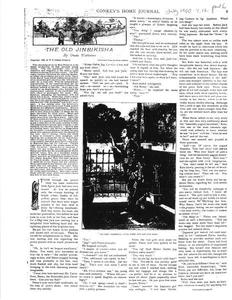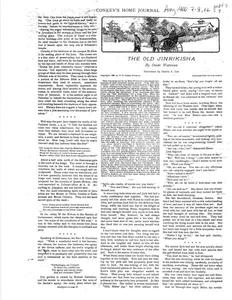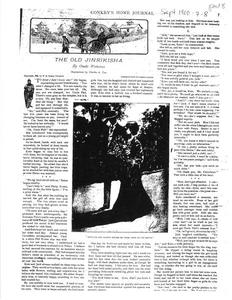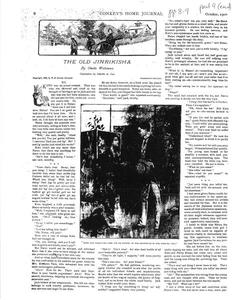The Old Jinrikisha
Copyright, 1900, by W.B. Conkey Company
Continued from the May number
This charming serial by Miss Watanna is the latest production of that versatile young writer. “The Old Jinrikisha” tells of the comedies and tragedies it has been a silent witness of during its earthly career. The February number contained the opening chapter, or rather the prologue; the story really began in the March issue, which related the adventure of an American girl who hires the “Old Jinrikisha” for a long ride. With the independence characteristic of her countrywomen, she decides to ho alone to a tea garden in Okubo, the western suburb of the city. Here she is accosted by an Englishman, who, knowing the unprincipled customs of the jinrikisha runners, offers to accompany her home. She, however, mistaking his intentions, will not allow him to do so. When they reach a dense forest, the jinrikisha man attempts to rob her, but she is rescued by the Englishman who has followed the “old jinrikisha” and its fair occupant. A few months after the adventure, Beryl Evans and the Honorable Frank Arthur Montrose are affianced sweethearts. Elinore Montrose has come to Japan to join her brother and to meet Ernest Crowder to whom she has been betrothed for three years. Beryl and Elinore become very intimate and make frequent excursions into the country. Upon one of these occasions they discover Crowder making love to a Japanese girl and Beryl happens to get a snap shot with her kodak. The Japanese girl asserts that Crowder is her husband, but the man denies it. Elinore dies of a broken heart, and driven to desperation by Crowder’s contemptuous disdain, his Japanese wife commits suicide after the manner of her race. Beryl’s brother, Philip, has taken a fancy to Crowder’s little daughter, and knowing the isolated life led by half-castes, offers to take the child to America.
V. (continued)
The older child was being made much of among the relatives, but the little one was crying passionately for her mother in a corner by herself. My runner had taken a circuitous path up the hill to the house, and I could see directly into the room, and, indeed, hear all that passed. I, however, only caught a dim glimpse of the older child. She went over to her little sister once and endeavored to comfort her, but was called away by some bitter relative.
Phil Evans took the sobbing little one in his arms, and brushed the tangled curls out of her eyes. They were larger than Japanese eyes, and so bright. They looked right into the young man’s face as though trying to read it. Something in the expression of genuine tenderness and pity for her assured her that she was with a friend. She let her little restless head sink contentedly on his shoulder, while one little hand stole caressingly to his face.
“Oo, such nize mans. Koto so tired,” she murmured in almost unintelligible English, and a few minutes afterward was asleep.
“Come, Phil. We must go now,” his sister told him after a while. He had wandered outside the house, and was sitting on the trunk of a fallen tree, looking thoughtfully down at the sleeping child in his arms. She was the prettiest little one he had ever seen, and Phil’s weakness lay in his love for children. Her hair was very black and silky, but when the sun touched it, strange gleams of dark red seemed to reflect back the light. It was the child’s Saxon blood, perhaps. A half-caste’s hair is usually either black or dark red, that is, black hair with red in it. The little one had long black silky lashes and russet red cheeks.
“Poor little thing!” murmured Beryl, pityingly, “I suppose its days of love and perhaps happiness are over now that its only real friend is gone—-its mother. These Japanese despise and dislike it for its father’s sake. They will neglect it, maybe mistreat it.”
Philip uttered a short, quick ejaculation, and rose to his feet.
“Beryl, they wouldn’t; no one could be anything but kind to a dear little thing like this. No! I won’t, I couldn’t believe it. Besides, it is the nature of the Japanese to be gentle and tender. Everyone says so.”
“Oh, I didn’t mean they’d be cruel exactly, but why, they’d neglect it, let it alone altogether. Besides, there are ways of being cruel to people without hurting them—-physically, I mean. We must be going now, Phil. I promised Frank to be home soon. He does not know where we are.” She beckoned to the Japanese to take the child from him.
“What—-who—-will take care of her?” the young man questioned.
“Tha’s whad I dunno,” the man said indifferently. “Mos’ those relatives b’long nudder hosban’—-nod to the girl. She have vaery few relatives—-vaery poor girl when our relative marry with her.”
“Oh! then she would not even be brought up by her own relatives.”
“Tha’s so,” the man admitted, shrugging his shoulders.
The young man took a few slow strides up and down, holding the little one close to him, resting his chin against the little dark head. He stopped short in his walk of a sudden.
“Can I have her?” he said simply.
“Phil, are you crazy?”
“No; I—-I—-never wanted anything so much in my life before,” he said boyishly. “I’d be good to her, Beryl, really I would. I’d—-”
“Yes, I know all about it. You’d be good,” his sister was laughing, “of course, you would be—-in your way. You silly boy. Why, you don’t know anything about bringing a child up—-the responsibility, the care, the—-”
“I’d keep her with me till she grew a little older, and then she could go to school like any other child, and—-why, Beryl, I could—-learn.”
“Learn! Oh, silly, come on now, like a good boy. Now, what would Miss Morgan say?”
“Miss Morgan? Oh, I—-I forgot her,” he confessed, a trifle despondently now.
“Forgot Miss Morgan! You haven’t been her shadow for all these weeks for nothing, have you?”
For the first time in Philip’s life, perhaps, he was glad of his youth.
“No; I like her, of course, but—-but-—er—-I’m only eighteen, you know, Beryl.”
“Yes, eighteen years, too young to marry, and—-er—-too young, certainly, to be a papa of a baby of two and more.”
The young man was hesitating. The child moved restlessly in its sleep, sighing, as children do after having cried themselves to sleep. Unconsciously it snuggled closer in his arms.
“I—-I can’t—-I won’t give her up,” the young man said. He turned to the Japanese, and his voice was quite determined. “Can I have her?”
The man consulted for a while among the relatives, and after a short, a very short, colloquy, informed Philip of their unanimous consent. He could not help thinking that they were glad to be rid of her.
“Just one thing more,” he said, and his voice had a full manly ring now. “Here is my permanent address. Any mail addressed to me there will be forwarded to me wherever I am. When this little one’s sister is old enough, and if she wishes, you will permit her to write to her?”
“Yes,” they agreed.
“And—-” he added, blushing, “I will try and have her always remember her mother’s country and her sister. We will take some Japanese woman as maid or nurse to her, and she won’t forget her own language then.”
And so three, instead of two, rode back in me to the hotel. Maybe the small added burden was responsible for the creaking I did. But, no, that was only my joyful laughter. I could not contain myself, for I was so happy in their goodness.
I do not know what he said to his friends or relatives, what explanation he made. He was doubtless independent of them all, and I know he did not regret his bargain, for, for many days before they sailed, I would see them together, always together, those two, always laughing and happy. They stayed for some months longer on the island and then one day, the day after Beryl’s marriage to Montrose, they all took passage for America, and I saw the last of them for many, many years.
VI.
Ah, me! it is so pleasant even for an old jinrikisha to be loved. Many a time have I sighed for the days when the Lady Natsu had loved me for myself, and yes, even for the American girl, Beryl Evans. It was fifteen years since she had left Japan. How old, how very, very old I was getting! Well, well, I wonder why it is that while old people are supposed to be treated with so much care and respect, old things are cast aside and despised. Oh, you human beings, some of you prating about kindness that ought to be shown to this and that dumb animal, wild animals, birds, and even fishes and insects, I wonder if there ever were any of you who paused to realize that inanimate things, such as chairs and tables and old jinrikisha, etc., have feelings also and love to be loved. Take my case: I am extremely sensitive, and I never have forgotten any one in my life who has been kind to me, and I’ll add to this, I have never forgotten any one who has been unkind. I am only an old jinrikisha, but my memory, it is white and black and bruised with the ill treatment I have received at the unscrupulous hands of the ignorant jinrikisha man who owned me for a number of years before that blessed earthquake, of which I have already told you, threw me before my new and most loved master of all. I’ll only say this, that just previous to that I grew fretty and cranky, and began to feel and show my age so badly that even the children ceased to care to play in me.
“Bah!” said one impudent little fellow one day as he kicked me (that kick remains on me to-day), “the old thing’s all broken down. Let’s go and play somewhere else”; and off they went like the wind, fickle little jades, only to return the next day.
Soon after finding me, my master, who was somewhat of a lover of antiquities,
1 began hunting up the records of my original family. He became very much
13 absorbed and interested in his task, tracing the family back one generation after another, back of even my dear master, Shomu Jokichi; and I am proud to tell you that the family record showed one long unbroken line of nobles, noted for their kindness, generosity, bravery, and goodness. My new master collected old family relics and heirlooms, and exhibited them very proudly as being once the property of the great Shomu family.
But the crowning act of interest in the family and their fallen fortunes was to search diligently in order to find if any member of the family were still alive. To this end, he employed the most expert lawyers and even detectives.
At the end of each week they would report to him. At the end of a couple of months the record consisted as follows—-I mean dating from the Lady Natsu—-as those who had gone before her I was not interested specially in, and doubtless you are not either:
“First: The Lady Natsu, a geisha girl—-afterward married to a poor, but noble, young man in Kyoto, named Inouye; offspring from this issue, one child, also named Natsu.”
“Second: Natsu, married twice, first to a worthy and well-to-do merchant of Tokyo, named Nosse, by whom she had one child, now living, named also Natsu; secondly, she married an Englishman, named Crowder, by whom she had one child, also living, named ‘Koto.’ This child had been adopted by English people, presumed to be the relatives of the said Crowder.”
My young master, whose name was Komatsu Taro, was very much pleased with all this.
“The next thing to be done,” he said, rubbing his hands cheerfully together, “is to find the two children now living. I wish to know them.”
Three days afterward he received communication that the eldest daughter, Natsu, had been found. She was living with relatives of her father.
Komatsu Taro gave an immense banquet, to which were invited all the nobles of his acquaintance, in order to meet the young girl, Natsu, and her relatives, who, though not themselves descendants of the Shomu family, were nevertheless, for her sake, welcome.
I can tell you I was nearly bursting with pride and delight, and my anxiety to see the young girl who bore the same name as my beloved little mistress of the past was unbounded.
About eight in the evening the guests began to arrive. I had a good position from where I could see each and all the guests. I could hardly contain myself in my eagerness to see the young girl. Scores of guests passed in at the gate, but the girl did not make her appearance till later in the evening. My master, who had worked himself up to such a state of interest in the family, kept coming over to my side, and looking about him expectantly.
When she finally arrived, she was accompanied by her relatives, about twenty or thirty in all.
As she came up the pathway toward me, for my master was receiving his guests at my side, I felt as if the ghost of my dear young mistress had risen from the grave, and was now sweeping down toward me.
I need not describe her to you. The picture of the dear Lady Natsu of the past will serve. The same refined, delicate beauty, the same sunny sweet smile, the same little hands and tiny feet. The gods were indeed good to me in my old age!
She bowed low with her relatives before Komatsu, murmuring her gratitude for what they termed his great condescension for deigning to notice any one so unworthy. And he looked at her long and earnestly.
It was permissible for him to address and converse with her. Modern etiquette permitted them this privilege. Komatsu was a much traveled man; he had been educated abroad in foreign lands, and his eyes had looked into those of women whose beauty could dazzle the senses, but I doubt me if ever before he had met any one who pleased him as the little figure that now stood before him, quietly and modestly. Maybe her style of beauty never would have appealed to a Western eye, but to a Japanese, everything about her, from the crown of her little shiny head to the tips of her tiny feet, was the ideal of what is meant by Japanese beauty.
“And you have a sister?”
“Yes, a little sister,” she told him. “She is an American.”
“And is she like you?”
“Yes—-no; not so honorably homely—-a little bit like me, but the sun is in her hair and eyes.”
“And the moon smiles in yours,” said Komatsu slowly.
“Ah, I thank you,” blushed Natsu. “You mean—-that—-I—-I am beautiful?” She marveled at this, for she had been kept in great seclusion, and her beauty had been hidden from her by her careful relatives, but Komatsu had learned the Western art of flattery toward womankind.
“Yes—-you are beautiful.”
“Ah-h!” she caught her breath. The flattery was very sweet. She wished he would say some more. “Thank you again,” she murmured, with her eyes cast down.
“Once your great-grandfather rode in and owned this jinrikisha,” he said. “See, here is his crest. You are of a great family.”
The girl examined it curiously.
“It is like what my mother ever worked on my kimono in gold braid. See?” She showed him a crest on the sleeve of her gown. He took a long time in examining it and then comparing it with that on my back, and his hands touched hers, and she blushed and looked down again.
“It is very good of you to come tonight,” he said, wishing to make her speak further.
“That was so good of you to invite,” she smiled.
And after she had gone out from his house, Komatsu rushed off to his relatives and to the nakoda like a possessed man.
“I must have her—-all my goods, my land, everything I possess is hers. Haste thee! Make good labor to secure her for me for bride.” Komatsu’s brain was filled with fire, a restlessness and desire to possess her, and after the formal fashion of the rich Japanese they became betrothed. The girl was not loath. She had been very much attracted by Komatsu, and her relatives smiled on the union also.
But one thing delayed the wedding. The girl, who had kept up a correspondence with her sister ever since they could write, was anxious to have her attend the wedding. They were waiting for her to come. At the time the news of her sister’s betrothal reached her, the young girl was in England, where she was studying. It was such a sweet letter she wrote her sister that I want to reproduce it here:
“My little big sister,” it ran, “I know you are little even though you always like to call yourself my big sister, because, forsooth, you are two paltry years older than I! What can I say that will half express my heart’s desire that all good happiness and joy may be yours?”
“Yes, I am coming. I have written to him, my dear guardian, whom I have not seen now for nearly five years—- ever since I have been studying my music, in fact, and he has cabled me to go at once. Moreover, he, too, is going to repeat his visit to Japan. He says it is fifteen years since he was there, and that he was a boy then. And for me? It is indeed about time that I visited my home that I love, though I may not remember it, for what are the memories of a child of two? Await me then, dear sister, and may all the gods of Japan, and all the world, smile on you. Koto.”
VII.
He had come out on the same steamer as Koto, and report had it among the passengers that he was in love with her. He was good looking after a fashion, tall and athletic, with even features, a little brown moustache, and large, rather sentimental eyes. He was an all-around nice young fellow, one of the kind that girls invariably fall in love with.
When Koto moved all her belongings into the little house where her sister lived with an old uncle and aunt, and announced that she proposed living in Japanese style while she was in Japan, Jack had looked dubious, and expressed it as his opinion that she never would get used to living like the Japanese, after her long residence among “God’s chosen people.” His advice to her was, “Stay at the American hotel by all means, and enjoy Japan through colored glasses.” I believe some old globe-trotter had given Jack this same advice before he had started out on his trip to Japan. But Koto was unalterable in her resolve.
“No, sir; I’m going to live with Natsu for—hm! The rest of her maiden days,” she said emphatically.
Jack Carruthers moped around the hotel for a few days after she left, feeling desperately lonely and blue, and then with a grim sort of feeling that was divorced from the better part of himself, he set out to hunt up the little house where Koto now lived, and which Jack thought was a “doosid” long way from the “doosid” hotel.
Arrived there, he was met at the door by Koto herself, and being a stranger to Japan and things Japanese, he fell an easy victim. The first impression a stranger has on entering a Japanese house is that the dainty, pretty, and altogether charming little house reminds him of some vague picture in a fairyland scene, or an Elysian dream. Then just as they have arrived at this conclusion, some little doll of a Japanese girl (generally happening to be especially pretty at this time, too) will arrive on the scene, and the harshest critic immediately becomes an ardent admirer. So it was with Carruthers.
“Well—-ah—-upon my word, Miss Crowder, this is a—-er—-most chawming little place; delightful—-ah—-er—-” he stopped short, and stared with fascinated eyes toward the fusama which was slowly sliding apart.
To be continued.
